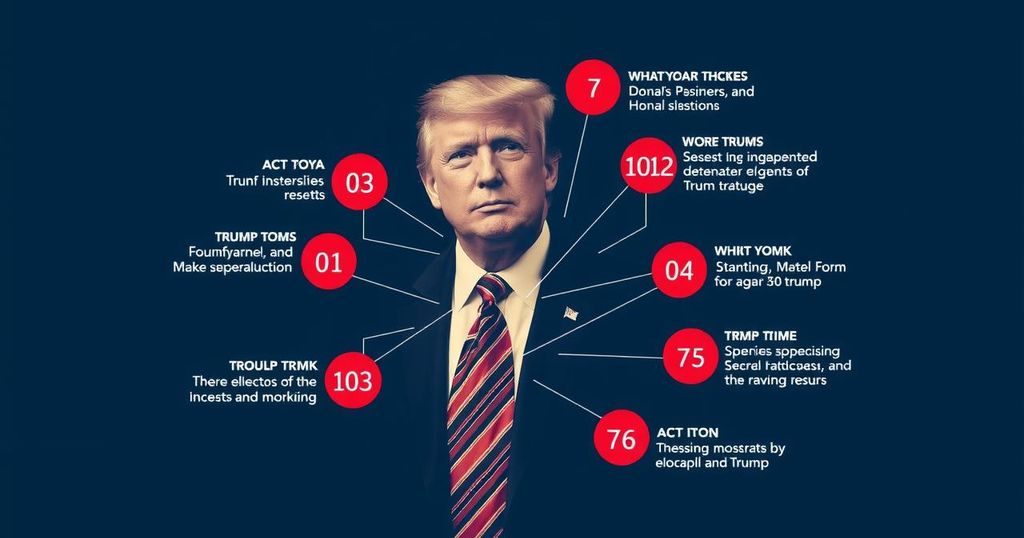Exploring the Global Anti-Incumbent Trend Behind Trump’s 2024 Victory

Donald Trump’s 2024 victory is attributed to a widespread voter rejection of the Democratic Party, particularly of Vice President Kamala Harris, who underperformed compared to President Biden in 2020. This trend aligns with a global anti-incumbent sentiment where voters across numerous countries have sought change, often driven by feelings of dissatisfaction towards their governments. As such, this electoral outcome urges a reevaluation of existing political strategies and public expectations.
President-elect Donald Trump’s anticipated victory in the 2024 election has been attributed to a discernible trend of voters shifting away from the Democratic Party. Unlike his predecessor, Vice President Kamala Harris experienced significant losses compared to President Joe Biden’s performance in 2020, affecting both urban and rural voters across varying political landscapes. This shift cannot be explained solely by conventional factors associated with campaign effectiveness or messaging strategies; it reflects a broader global trend characterized by heightened anti-incumbent sentiment. The 2024 electoral cycle marked a milestone as the most extensive election year in history, with unprecedented voter turnout. Globally, citizens expressed a desire for change, evident in recent elections across diverse nations from the United Kingdom to South Africa, as well as in India and North Macedonia. Notably, this anti-incumbent wave is not an isolated American phenomenon but rather part of a larger, international trend where voters, across a range of ideologies, have opted for new leadership. Research indicates that dissatisfaction with the current political direction has been pivotal in these shifts. In the United States, three different exit polls indicated that at least 70 percent of voters were unhappy with the nation’s trajectory. This widespread discontent translated into electoral success for Trump, suggesting that his positioning as the change candidate resonated with voters despite his previous presidency. Moreover, analyzing Harris’s defeat through a global lens reveals that her challenges extend beyond specific demographics or messaging tactics, reinforcing a narrative of collective voter discontent. This unprecedented uniformity in voter behavior challenges traditional political narratives that attribute electoral outcomes to localized campaign strategies. With various factors, including economic conditions such as inflation, contributing to public sentiment, it becomes essential to consider broader implications surrounding voters’ desires for political upheaval, which could foster instability or volatility in governance. Given this context, Trump’s victory underscores a critical junction in American and global politics, where voters increasingly prioritize change over incumbent stability. This trend raises vital questions about the current political landscape and suggests that incumbents everywhere, including potential Republican leaders, may face similar electoral challenges in future elections, aligning with a global propensity toward anti-establishment sentiments.
Understanding the context of the 2024 election and Donald Trump’s subsequent victory requires a recognition of the global landscape of public sentiment toward incumbent governments. A surge in anti-incumbent sentiment has recently emerged worldwide, with voters increasingly dissatisfied with their leaders, regardless of political affiliation. This trend reflects a broader disaffection with established political norms, accentuated by contemporary economic challenges such as inflation. As 2024 witnessed an unprecedented number of elections and global voter engagement, it signaled a collective desire for change across multiple nations. Analysis of Trump’s electoral success should thus be framed within this global movement, providing insights into the complex dynamics of voter behavior and political sentiment in democratic societies.
In conclusion, Donald Trump’s victory in the 2024 election epitomizes a significant shift in voter sentiment both in the United States and globally. This outcome reflects a pervasive trend of dissatisfaction with incumbents, driven by economic factors and a universal desire for political change. As voters continue to express discontent with governmental stability, it becomes imperative to examine how these sentiments shape future electoral outcomes. The potential for political volatility remains high as traditional norms are increasingly challenged by this global wave of anti-incumbent fervor.
Original Source: www.vox.com






